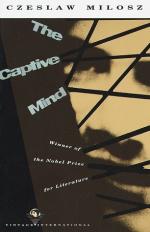|
This section contains 433 words (approx. 2 pages at 400 words per page) |

|
Chapter 9, The Lesson of the Baltics Summary and Analysis
In this chapter, Milosz focuses on Estonia, Latvia and Lithuania. Each has their own language and culture. They became independent countries after World War II and were agricultural countries with about six million people in 1939. They had no military. Under the terms of the Molotox-Ribbentrop treaty, the Russians established military bases in these countries in 1939, and in 1940, took over the countries. The inhabitants now were citizens of the Soviet Union.
The Russians set up elections which consisted of their candidates only. If the people didn't vote, their passport wasn't stamped and they were considered enemies. There were mass deportations to labor camps. In 1941, the Nazis invaded and there were more arrests and deportations to labor camps, this time Nazi camps. The Nazis remained in control until 1944, when the Red Army captured...
(read more from the Chapter 9, The Lesson of the Baltics Summary)
|
This section contains 433 words (approx. 2 pages at 400 words per page) |

|




